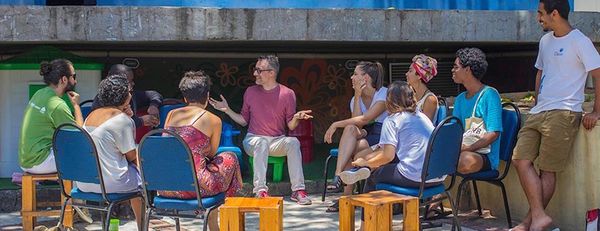Bordeaux - January 2019/Session
 An Introduction to Dialogical System Design |
About this event[modifier]
In times of intense collective strain we are emboldened to forge new systemic responses to perennial common needs. The design and functioning of such new or radically transformed social systems calls us to earnest, courageous, playful creativity. Experiments in this field pulse outwards from the beating heart of care for all life and are thus responsive to the rapidly shifting times. They provide not a single course of action but an ongoing, active listening to communities in transition. Both structurally and in each moment, they are rooted in dialogue.
Nonviolence provides principles for the architecture of this work and guidelines along the way. Marshall Rosenberg’s weaving of research and practice reminds us that nonviolence calls us at each step to align within ourselves, with others and socially - as one movement of integrity. However it is in the direct experiencing of these new dialogical social systems, in questioning partnership with the uncertainty that is their nature, that we begin to integrate their ways and the cohesion, self-healing, mutual support and collective self-determination that they further.
For the last 23 years Dominic Barter and his colleagues in Brazil have been developing dialogical social systems in some of the most challenging environments. In this weekend of practical exploration we will take an experiential look at 4 such systems: Restorative Circles, Financial Coresponsibility, Empathic Support Systems and the Beta Space educational model. Connecting each we will identify the common principles of Dialogical System Design and how they may be used to map and support the innovations emerging in your organizations, families and communities. In a modest way we will make the structure of the event itself a living experiment in applying this work as we go.
Dominic Barter[modifier]
Dominic Barter is internationally recognized for his work collaborating on the design of empathic social technologies that promote dialogue and partnership, with particular focus in the areas of justice, education, culture and social policy. He has spent over 20 years in the field. In the mid-1990s he co-developed Restorative Circles, a community based and owned practice for dynamic engagement with conflict forged in the gang-controlled shantytown favelas of Rio de Janeiro. He adapted the practice for the Brazilian Ministry of Justice's and State Education Departments’ award-winning national projects in Restorative Justice and has supported its spread throughout Brazil and in a further 47 countries, working with communities, courts, civil conflict, education, activists and government. In 2016 the work was recognized by a National Council of Justice resolution defining the roll out of restorative systems in courts at the federal level.
Dominic served as president of the Board of Directors for the international Center for Nonviolent Communication and as a member of the International Advisory Board of the journal ‘Restorative Justice’. He founded the CNVBrasil network in Brazil and has introduced Nonviolent Communication to many thousands of people throughout the country, in events and community projects sustained through an innovative process of economic solidarity called Financial Co-responsibility. In 2015 he gave the opening keynote address at the 5th National Conference on Restorative and Community Justice, in Florida.
During this period Dominic spent 3 years as a school teacher for 8 to 17 year olds, and has recently initiated the Espaço Beta program, a network of innovative middle and high schools based on relational intelligence.
Inclusion and Finances[modifier]
We invite all participants to Financial Co-responsibility for this event - a practice proposed by Dominic for consciously sustaining systems, projects and events without restricting participation for those with less access to money.
This event is neither charged nor free. During our time together we will share information on the costs of the event, the livelihood of the people offering it as a gift, and the projects they are engaged in, including the work in Brazil. Then we will describe a simple mechanism for financial contribution to cover those costs, contribute to the livelihood of those creating the event and to sustain and expand the projects they do. These can be offered in cash or by check - we will not have the option of receiving contributions with credit cards. We will then calculate what was donated and let the group know. Afterwards, each person in the organization of the event will share what was contributed between them, in a circle process that seeks to care for the material well being of all involved.
For those that require financial support with transport and other simple costs to be with us on the day we will also use a simplified version of this same process to care for costs that might otherwise present restrictions on your participation.
Date, time and place[modifier]
- Friday 18 from 14:30 to 21:30
- Saturday 19 from 14:30 to 21:30
- The venue will be located in Bordeaux, in a location accessible by tramway.
- The address will be sent to you by email, with confirmation of your registration.
- The room in which we will be is accessible without going up or down stairs.
To register[modifier]
http://cerclesrestauratifs.org/ls/index.php/571181?lang=en